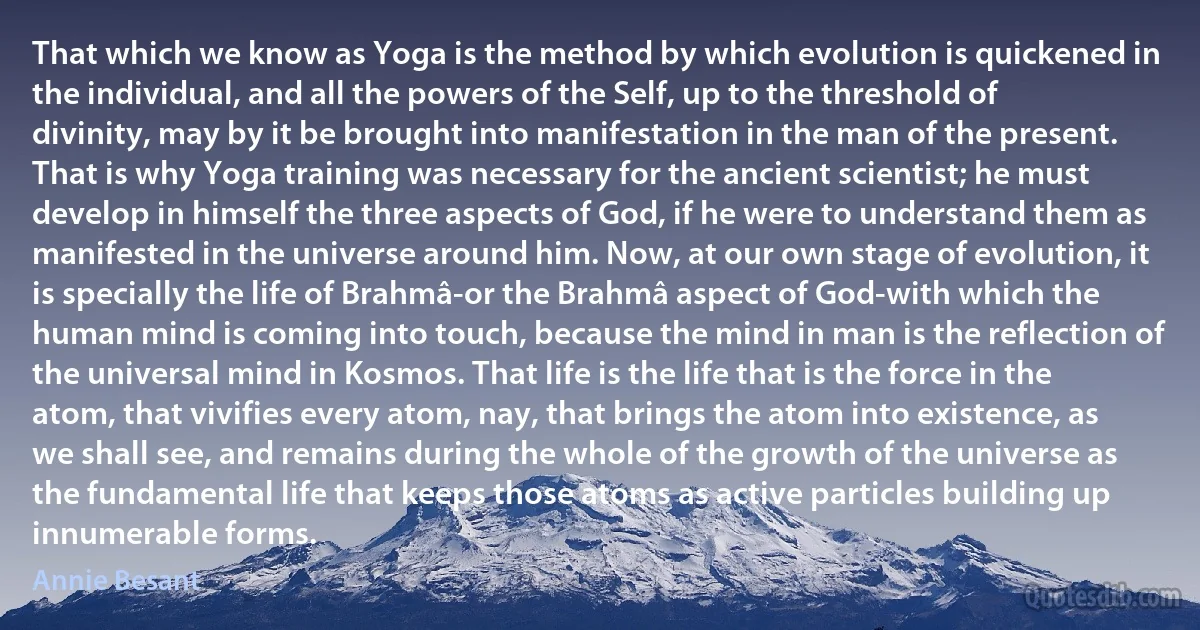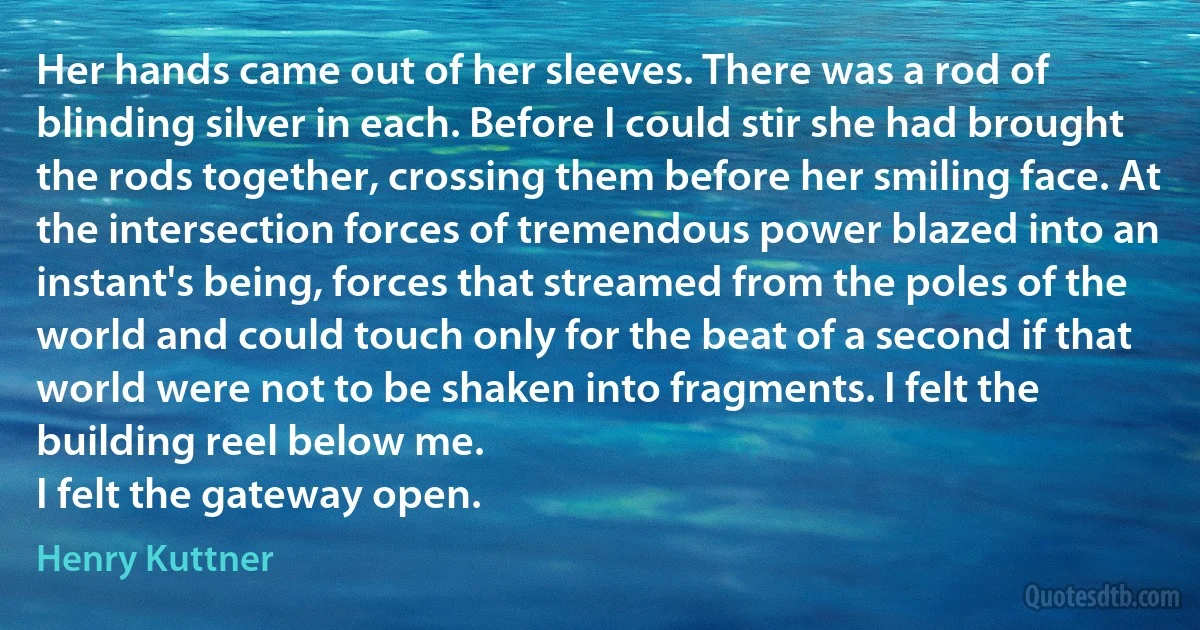Touch Quotes - page 81
When the Church says that, in the dogmas of religion, reason is totally incompetent and blind, and its use to be reprehended, this really attests the fact that these dogmas are allegorical in their nature, and are not to be judged by the standard which reason, taking all things sensu proprio, can alone apply. Now the absurdities of a dogma are just the mark and sign of what is allegorical and mythical in it. In the case under consideration, however, the absurdities spring from the fact that two such heterogeneous doctrines as those of the Old and New Testaments had to be combined. The great allegory was of gradual growth. Suggested by external and adventitious circumstances, it was developed by the interpretation put upon them, an interpretation in quiet touch with certain deep-lying truths only half realised. The allegory was finally completed by Augustine, who penetrated deepest into its meaning, and so was able to conceive it as a systematic whole and supply its defects.

Arthur Schopenhauer
Enya and her team record and we stay in touch until there is something for me to listen to. I then provide an outside view. She is a genius in the studio, comparable to somebody like Brian Wilson, but she and Nicky can be their own worst enemies at striving for personal best all the time. I guess that's the price of perfectionism.

Enya
Ah, that Time could touch a form
That could show what Homer's age
Bred to be a hero's wage.
'Were not all her life but a storm,
Would not painters pain a form
Of such noble lines,' I said,
'Such a delicate high head,
All that sternness amid charm,
All that sweetness amid strength?
Ah, but peace that comes at length,
Came when Time had touched her form.

William Butler Yeats
"Another white man's trick! Let me go! Let me die fighting!” cried Crazy Horse. He stopped and tried to free himself and draw his knife, but both arms were held fast by Little Big Man and the officer. While he struggled thus, a soldier thrust him through with his bayonet from behind. The wound was mortal, and he died in the course of that night, his old father singing the death song over him and afterward carrying away the body, which they said must not be further polluted by the touch of a white man. They hid it somewhere in the Bad Lands, his resting place to this day.

Crazy Horse
The major suggested we go down a gully, but I knew that was the wrong way. And I told him we were not going down any gully. We were going straight through the German front line trenches back to the American lines.
It was their second line that I had captured. We sure did get a long way behind the German trenches! And so I marched them straight at that old German front line trench. And some more machine guns swung around and began to spit at us. I told the major to blow his whistle or I would take off his head and theirs too. So he blew his whistle and they all surrendered - all except one. I made the major order him to surrender twice. But he wouldn't. And I had to touch him off. I hated to do it. But I couldn't afford to take any chances and so I had to let him have it.

Alvin York
On every side now the Socialist controversy grew, and I listened, read, and thought much, but said little. The inclusion of John Robertson in the staff of the Reformer brought a highly intellectual Socialist into closer touch with us, and slowly I found that the case for Socialism was intellectually complete and ethically beautiful.

Annie Besant
At the beginning of my present earthly existence I was put into touch with many people who said they had a great inner aspiration, an urge towards something deeper and truer, but were tied down, subjected, slaves of that brutal necessity of earning their living, and that this weighed down upon them so much, took way so much of their time and energy that they could not engage in any other activity, inner or outer. I heard that very often.

Mirra Alfassa
At that time I also had, for a short while, the strength to bear it. But all too soon I lost external sight of the shape of that beautiful man, and I saw him disappear to nothing, so quickly melting away and fusing together that I could not see or observe him outside of me, nor discern him within me. It was to me at that moment as if we were one without distinction. All of this was external, in sight, in taste, in touch, just as people may taste and see and touch receiving the external sacrament, just as a beloved may receive her lover in the full pleasure of seeing and hearing, with the one becoming one with the other. After this I remained in a state of oneness with my Beloved so that I melted into him and ceased to be myself. And I was transformed and absorbed in the spirit, and I had a vision about the following hours.

Hadewijch
It was contrary to his habit to finish at one painting, and he used to say that a poet who improvises cannot hope to form pure verses. But of i condiments ' in the shape of last retouches he was particularly fond. Now and then he would model the light into half tint with a rub of his finger; or with a touch of his thumb he would dab a spot of dark pigment into some corner to strengthen it ; or throw in a reddish stroke-a tear of blood, so to speak-to break the parts superficially. In fact, when finishing, he painted much more with his fingers than with his brush.

Titian
The common people remember and tell of what they are able to grasp and what they are able to transform into legend. Anything else passes them by without deeper trace, with the dumb indifference of nameless natural phenomena, which do not touch the imagination or remain in the memory. This hard and long building process was for them a foreign task undertaken at another's expense. Only when, as the fruit of this effort, the great bridge arose, men began to remember details and to embroider the creation of a real, skilfully built and lasting bridge with fabulous tales which they well knew how to weave and to remember.

Ivo Andrić
He knew the depth of beauty, He was for ever surprised by its peace and its majesty; and He stood before the earth as the first man had stood before the first day.
We whose senses have been dulled, we gaze in full daylight and yet we do not see. We would cup our ears, but we do not hear; and stretch forth our hands, but we do not touch. And though all the incense of Arabia is burned, we go our way and do not smell.

Kahlil Gibran
These are the very people who are always talking about micro-aggressions in the workplace and how you should be, you know, not have to face an uncomfortable moment or, you know, people shouldn't touch you or unwanted leave. Suddenly, they were okay with this. It just seemed to show, to me, broken morals. Like, you really have no principles.

Bill Maher
You think I'm insane?" said Finnerty. Apparently he wanted more of a reaction than Paul had given him.
"You're still in touch. I guess that's the test."
"Barely - barely."
"A psychiatrist could help. There's a good man in Albany."
Finnerty shook his head. "He'd pull me back into the center, and I want to stay as close to the edge as I can without going over. Out on the edge you see all kinds of things you can't see from the center." He nodded, "Big, undreamed-of things - the people on the edge see them first.

Kurt Vonnegut
I really don't go in for talking about current events on the blog. The main reason for this is the fact that I am profoundly out of touch with the outside world. I don't have cable and I don't watch the news. On the rare occasion I miss the news and feel the need to absorb some fearmongering bullshit, I just drop a tab of acid and read a Lovecraft story. There's less pretense that way.

Patrick Rothfuss
Then I knew that the last test of sanity had failed me, for it was no longer possible to tell the unreal from the real. The last test fails when the illusion moves into life itself and you can touch and feel and handle the commercial vision as if she were the real woman. There was no defense any more.

Henry Kuttner
...I'm curious about how my memories - and other people's memories, too - are tied to the senses, particularly touch. Memories triggered by engagement with one or more of the five senses can conjure up transformative moments in a person's life. Unexpected sounds, scents, tastes, sights, and tactile experiences can move people outside the present moment and into a more playful space where past, present, and future come together...

Ebony Flowers
I would I were a careless child,
Still dwelling in my Highland cave,
Or roaming through the dusky wild,
Or bounding o'er the dark blue wave;
The cumbrous pomp of Saxon pride,
Accords not with the freeborn soul,
Which loves the mountain's craggy side,
And seeks the rocks where billows roll.
Fortune! take back these cultur'd lands,
Take back this name of splendid sound!
I hate the touch of servile hands,
I hate the slaves that cringe around:
Place me among the rocks I love,
Which sound to Ocean's wildest roar;
I ask but this-again to rove
Through scenes my youth hath known before.
Fain would I fly the haunts of men-
I seek to shun, not hate mankind;
My breast requires the sullen glen,
Whose gloom may suit a darken'd mind.

Lord Byron
I was not influenced by composers as much as by natural objects and physical phenomena. As a child, I was tremendously impressed by the qualities and character of the granite I found in Burgundy, where I often visited my grandfather...So I was always in touch with things of stone and with this kind of pure structural architecture - without frills or unnecessary decoration. All of this became an integral part of my thinking at a very early stage.

Edgard Varèse
I am more and more convinced that taking life over-seriously is a frivolous thing. There is an affected self-dramatizing in the brooding over one's prospects and destiny. The trifling attitude of an Ecclesiastes is essentially sober and serious. It is in closer touch with the so-called eternal truths than are the most penetrating metaphysical probing and the most sensitive poetic insights.

Eric Hoffer



